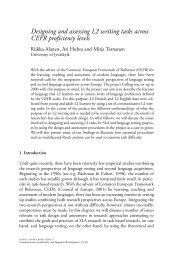BOOK OF ABSTRACTS - EUROSLA
BOOK OF ABSTRACTS - EUROSLA
BOOK OF ABSTRACTS - EUROSLA
Create successful ePaper yourself
Turn your PDF publications into a flip-book with our unique Google optimized e-Paper software.
linguistic proficiency attained by adult heritage speakers raise several<br />
fundamental questions about the stability of early childhood bilingual<br />
acquisition and the role of input and use in the development and<br />
maintenance of a native language. They also raise key questions about the<br />
role of age and experience in the ultimate attainment of early and late adult<br />
bilinguals.<br />
Because many college-age heritage speakers turn to the foreign or second<br />
language classroom to learn, relearn, or expand their knowledge of the home<br />
language, critical questions also arise as to how heritage speakers are similar<br />
to, or different from, postpuberty second language learners.<br />
In this talk, I will present recent experimental research addressing the<br />
following questions: 1) Which areas of linguistic knowledge are robust and<br />
which are fragile under incomplete acquisition in both second language<br />
learners and heritage speakers? 2) Does age of acquisition bring an<br />
advantage to heritage speakers in terms of native-like linguistic knowledge<br />
as compared to late second language learners? 3) Do differences in the<br />
language learning experiences of heritage speakers and second language<br />
learners play a role in the behavioral manifestations of their linguistic<br />
knowledge? And finally, Can a heritage language be successfully reacquired<br />
in the classroom after the critical period? While extending research questions<br />
and methodologies from second language acquisition has significantly<br />
enlightened our current understanding of heritage language acquisition, I<br />
will advocate for the fruitful integration of other fields to advance this<br />
inquiry and point to potential directions in need of further research.<br />
6<br />
Exploring high level proficiency in SLA – the case of French L2<br />
Inge Bartning<br />
Stockholm University<br />
The talk will take as a starting point a short presentation of the InterFra<br />
corpus at Stockholm university (www.fraita.su.se/interfra) and of earlier<br />
results of developmental stages in French L2. This presentation also includes<br />
an ongoing joint research programme that explores features of non-<br />
/nativelikeness, called High level proficiency in second language use at five<br />
departments at the same university (www.biling.su.se/AAA~).<br />
In order to contribute to the debate on native-likeness and to explain recent<br />
results in the oral production of high level proficiency in French L2 we try to<br />
identify domains where there still are interesting differences between L2<br />
users and native speakers, namely formulaic language, organisation of<br />
information structure, morpho-syntactic deviances and fluency. The data<br />
come from three groups of advanced to near-native speakers (so called ‘late<br />
learners’) and a native control group. Our hypothesis is that there may be<br />
interesting interdependencies between the four domains that illustrate both



